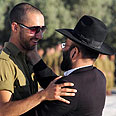
An insider's guide to IDF's haredi regiment
Strictly kosher diet, no women and five times the average number of married troops: Welcome to IDF's Netzah Yehuda haredi regiment, where draft dodging was never in the cards
Any other IDF canteen would be surprised by the decision, but at the haredi regiment, the likes of which might soon multiply in the IDF if the Plesner Committee outline is approved, they are not taking any chances.
Related stories:
- Plesner Cmte: 80% of haredim will serve in IDF by 2016
- Plesner Cmte member: Historic opportunity missed
- Tal Law: Should yeshiva students be forced to enlist?
The haredi regiment is composed of men from a wide range of haredi sects: Yeshiva drop-outs, Hesder yeshiva students, religious en who prefer the more 'devout' regiment, followers of the Chabad chasidic sect, religious men making aliyah to enlist and yes, "Average" haredim from Jerusalem and Bnei Brak.
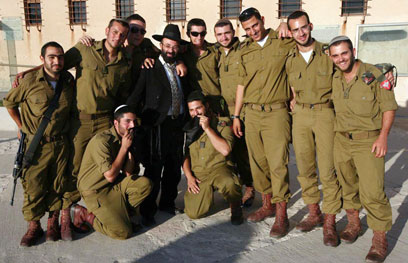
'Giving their heart and soul' (Photo: Gil Yohanan)
There is a clear set of rules and regulations for these yarmulke wearing soldiers. The staff officers are all men (eight of which are secular) and no immediate contact between the male and female soldiers – including IDF Personnel Directorate Major-General Orna Barbibai who visited the base a few months ago.
The haredi regiment which was founded at the end of 1999 and started out as a small company of 32 troops is now one of the largest regiments in the IDF, with hundreds of combat soldiers and on average has around 100 more soldiers in its ranks than any other regiment.
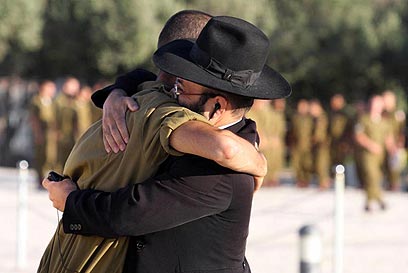
More soldiers than any other regiment. (Photo: Gil Yohanan)
A soldier in the regiment usually serves for two years and then spends a year completing high school final exams and acquiring a profession for civilian life.
Recruitment by word of mouth
One of the most significant issues when enlisting haredi soldiers is the cost of enlisting each man. Today, a haredi soldier who is married with children is eligible for a monthly stipend worth thousands of shekels and that is before the cost of investing in special kosher certification, the special physical conditions and the need for special functionaries for the haredi regiment is discussed.
When they are discharged and become taxpaying members of Israel's workforce they will most likely balance out the investment.
The regiment has some 70 lone soldiers (who receive special benefits) two to three times the number of lone soldiers in a regular regiment, and 25 married soldiers (five times the regimental average). Soldiers with three children, and there are plenty who have three children, are eligible for a service exemption, but some prefer to stay and serve.
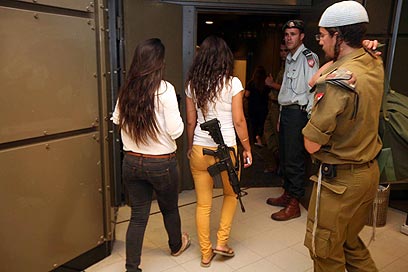
No girls allowed (Photo: Gil Yohanan)
Recruitment is usually done by word of mouth, without any recruitment stands or centers. The soldiers are obliged to always have their yarmulkes on and of course, observe Shabbat.
There are virtually no refusals to obey an order; one of the only incidents occurred 18 months ago when a combat soldier refused to carry out an operational drill on Friday night, he was punished.
The meticulousness is in the smallest details: The lights in the walkie-talkies were replaced last year with special energy saving bulbs that do not burn out so that Shabbat will not be desecrated – should the need to replace a bulb arise.
During basic training the soldiers attend all prayer services together, but when they are deployed, their varying schedules mean that each soldier prays in his own free time.
The regiment commander, Lieutenant-Colonel Amichai Segal is in no rush to rid the regiment of soldiers who are less observant of halachic laws and only does so when the soldier shows a tendency for rule breaking.
'Negligible cost'
One officer who had nothing but praise for the regiment was Colonel Udi Ben Muha, commander of the Kfir Brigade, through which the haredi Netzah Yehuda regiment operates.
In an interview to Ynet in April he refuted claims that the Netzah Yehuda regiment was a "black ghetto in the army" and claimed that it was a successful infantry regiment and that he wished "there were more like it. The costs of the regiment were negligible when compared with its national importance."
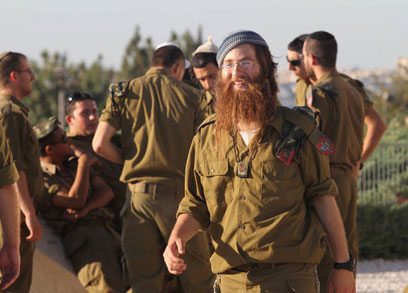
Yeshiva students want to contribute (Photo: Gil Yohanan)
On Wednesday, just before sunset, a ceremony was held at Latrun for the troops who completed their combat course. The IDF decided to keep the event low profile and avoid making any comment on the issue of the haredi draft so long as the matter has yet to be decided in the political arena and so the event was closed to the press.
On paper, this ceremony was just one of dozens, if not hundreds which was being held throughout the year at Latrun, throughout the year, but the timing of this ceremony, hours after the Plesner Committee's recommendations were published, did not escape the troops in spite of their excitement.
"The public and the decision makers should come to the Mavo Dotan position and the pillbox near Kfar Yaved and see us – religious and haredi soldiers – proud to give their heart and soul to the State without losing our Jewish identity for even a moment," one soldier said ahead of the ceremony.
"I hope that soon we will no longer be considered unique. I have neighbors and friends who are dying to enlist, be combat soldiers and are green with envy when they see me coming home with my firearm."
"If I succeed in being a soldier and studying torah at the base, then why can't others? The decision makers should go to Kahanman Street in Bnei Brak and see the number of 16 and 17 year olds who dropped out of the yeshivas and become bums in the best case and street kids in the worst case.
"There are those who study in yeshivas and also want to contribute, and there are rabbis and yeshiva heads who silently agree."

Completing their course (Photo: Aharon Steinmetz)
Rabbi David Fuchs, one of the rabbis of the haredi nahal that has accompanied the Netzah Yehuda regiment congratulated the troops and said: "As someone who has accompanied the company every day through torah classes and personal conversations, I am happy and moved to see the highly motivated soldiers, something you don't see every day.
"The soldiers are enthusiastic and feel a sense of vocation in their contribution to the citizens of Israel. I wish them success and strength on their way ahead."
The IDF spokesman said: "In accordance with the regiment's regulations, milk products without the strictly kosher seal are not to be sold, which is why certain products were removed (from the canteen). The Netzah Yehuda course obligates the observance of strict rules of kashruth and it is within the officers' authority to enforce the observance (of these rules)."
- Receive Ynetnews updates directly to your desktop










